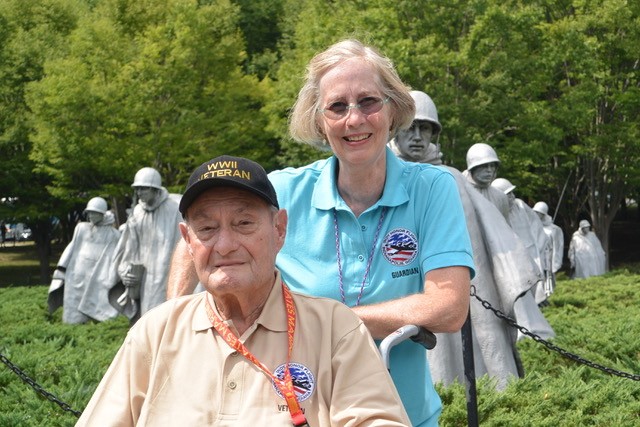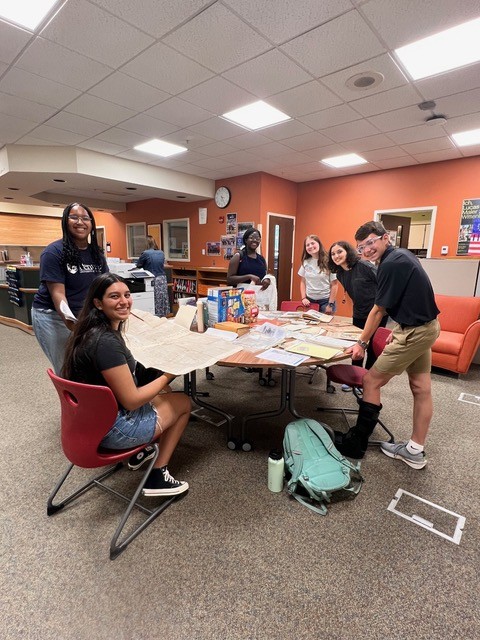Saving History, One Story at a Time

Spotlight on Indiana Society’s President, Kathryn Lerch’s Legacy Initiative Project
By Andrea Neal, NSCDA-IN
Francis W. Mitchell was fascinated by airplanes from the time he was a boy, but a moderate case of nearsightedness ruled out his dream of becoming a pilot in the armed services. World War II gave him another chance.
Finding the nation in sudden need of hundreds of thousands of airmen to join the war effort, U.S. Army Air Forces loosened their rigid eyesight rules. “I came home from work one day, and my wife showed me an article in the paper where the Army was training pilots … with minor physical problems,” Mitchell recalled. “So I signed up.” At the time, Mitchell, a newlywed working in the defense industry had little risk of being drafted. Before long, he would find himself in the European Theater as a glider pilot delivering essential supplies and munitions to Allied troops.

Mitchell’s unexpected path to bravery is one of hundreds documented by high school students in Kathryn Lerch’s Legacy Initiative Project at Park Tudor School in Indianapolis. Lerch, a longtime history teacher, is president of the Indiana Society and a national Roll of Honor recipient.
The Legacy Initiative Project, now in its 26th year, immerses students in hands-on learning as they transcribe and record the letters, journals, and oral histories of veterans from the Civil War to modern-day conflicts. Students participate in research field trips to the National Archives, Civil War battlefields, World War II sites in Europe, and other landmarks. In January 2000, the project published the first in what would become a series of books Words of War: Wartime Memories from the Civil War Through the Gulf War.
The same year, recognizing the urgency of collecting World War II stories, Congress commissioned the Library of Congress Veterans History Project to “preserve and make accessible the personal accounts of American war veterans so that future generations may hear directly from veterans and better understand the realities of military service.”
The partnership opportunity was obvious to U.S. Sen. Richard G. Lugar of Indiana, who urged Lerch’s students to contribute their work to the growing national database. Park Tudor subsequently submitted more than 700 oral interviews, including Mitchell’s, to the Library of Congress. Colonial Dames embraced the Veterans History Project beginning in 2018, and state societies have sent over 500 interviews to the National Archives.
The veterans’ stories are both ordinary and extraordinary: ordinary because the storytellers are among 41 million men and women who have served in uniform since revolutionary times ~ 250 years. Extraordinary because they reveal uncommon acts of bravery, many that would have gone untold if not for these volunteer efforts.
Flight Officer Mitchell shared one such story with student Andrew Stickney during their meeting at Park Tudor in September 2011. Mitchell had recounted his journey to becoming a pilot and flight instructor, which was followed by assignment to the 50th Troop Carrier Squadron in the 314th Troop Carrier Group of the 8th Air Force. In the days following the Normandy landings, Mitchell and a co-pilot were selected to deliver two tons of cannon shells to a drop zone along the Rhine River, as Allied forces fought to push the Nazis back into the German interior. Previously confident of his piloting skills, Mitchell was uncertain he could complete the task:
“As we got to the river, I was deeply concerned because there was going to be shooting, and I didn’t like the idea of that … The sky was a beautiful clear blue. Wonderful day. But as we were approaching the river from the west side, I could see planes flying out of there, some with engines on fire, some with damage. They had been beaten up by ground fire. Anti-aircraft … There was so much smoke, I couldn’t really see the ground. I couldn’t recognize our drop point if I was over it, and I might have been. Then came the anti-aircraft fire. While I had seen it in movies, I had never heard it. And that scared the wits out of me. It was like, if you can imagine it, setting off a whole package of firecrackers at the same time – bang, bang, bang, bang, bang – a piercing nasty sound … I thought at the time: If I survive this, nothing is ever going to scare me again. And nothing has.
It was like there was a separate piece of my brain. One part was so frightened I thought my head was going to explode, the other half did what I was trained to do, and I made a successful landing … I climbed out of my glider and there was another glider sitting there, and we walked over in that direction … and there was a dead American there. Good looking kid. Hispanic. Maybe 18. Dead. I got so mad. I was ready to kill the entire German population…”
Mitchell and his co-pilot didn’t know where they were and wandered aimlessly until they came across a field with twenty 37-millimeter cannons – serendipitously the ones for which he had brought the ammunition. “This is the amazing thing about war: It’s absolute utter chaos, but if it’s planned right, there’s enough of the right stuff.” Mitchell, age 92 when the interview took place, died in 2016 at age 96.
Lerch stepped down as History Dept. Chair in 2013, and from full-time teaching in 2019. She remains committed to the Legacy Initiative Project, which is offered as a once-a-week club at the high school for its many benefits – to both students, families, and local communities. History students master research skills before heading to college, and veterans get to share often suppressed memories of military victories and horrors. “Many are thrilled to be asked to tell their stories,” Lerch reflects. “Others are hesitant for lots of reasons.” One pilot who crash landed his bomber amidst intense fighting had told his story only once – to his wife immediately upon his return to the states. After sharing with the Legacy Initiative, “he was finally able to sleep through the night. For the veteran it can be painful, but it can also be a catharsis.”
Since it began in 1999, the Legacy Initiative Project has published six volumes in the Words of War series, four monographs (most recently featuring the correspondence of Alma De Luce, wife of AP correspondent and 1942 Pulitzer Prize recipient Daniel De Luce), and four travel journals for use by students. In 2024, the Project transitioned to writing research-based articles for the school alumni quarterly magazine. They are also collaborating on a variety of special projects, such as conducting detective work for the American Ancestors’ “10 Million Names” program to identify enslaved men and women and collecting census and newspaper evidence to personalize experiences for many of the 2,800 soldiers who served in the Eighth N.Y. Heavy Artillery Regiment, during the Civil War. This summer student volunteers will help a local author transcribe a special wartime collection of documents and letters written by Gertrude Pinsker, who sought to bring Jews to South America during World War II.
Such projects bring history alive for students, notes Caroline Tucker Mehta, one of Lerch’s former students, who majored in history at Princeton University, received a master’s degree from the University of Chicago, and is now pursuing a doctorate in education at Harvard University. “It certainly helped set me on my path to studying history and doing archival work.” Tucker observes. “It’s just so rare for students to have the opportunity to do that kind of work, particularly their freshman year of high school.”
